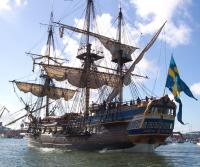 Sad news. The Götheborg, a replica of an 18th-century Swedish East Indiaman, is for sale. The Ostindiefararen Götheborg Foundation which owns the ship says it can no longer afford to run the replica, which is one of the world’s largest operational wooden sailing vessels. The Götheborg made her maiden voyage in 2005 and is modeled after the East Indiaman of the same name which sank on September 12, 1745, while approaching Götheborg harbor on her return from a third voyage to China.
Sad news. The Götheborg, a replica of an 18th-century Swedish East Indiaman, is for sale. The Ostindiefararen Götheborg Foundation which owns the ship says it can no longer afford to run the replica, which is one of the world’s largest operational wooden sailing vessels. The Götheborg made her maiden voyage in 2005 and is modeled after the East Indiaman of the same name which sank on September 12, 1745, while approaching Götheborg harbor on her return from a third voyage to China.
From the foundation press release: “This is a tough decision that we’ve been forced to make,” says Lars G Malmer, Chairman of the owning Foundation. “We’ve done our utmost to find a solution that would enable the ship to continue sailing and to serve as the amazing platform for marketing Sweden and Gothenburg that it is.”
The voyages following the return from China were made possible thanks to substantial support from the founders (AB SKF, AB Volvo, Stena AB, Business Region Göteborg, the Port of Gothenburg, the City of Gothenburg and Region Västra Götaland), which secured the basic financing to keep the ship in seaworthy condition.
“But now this part of the ship’s life has come to an end. We would have preferred her to continue sailing, but can confirm that the financial conditions do not exist, so the Foundation will now try to find the best solution for the ship, and one part of this process is to see whether there are any interested parties with different conditions in Gothenburg, Sweden or somewhere else, who are prepared to commit themselves to taking over the ship, thus making it possible to continue sailing”, continues Malmer.
On its expeditions around the world, the Swedish Ship Götheborg has served as a successful platform to show off Swedish business, culture and society. Furthermore, since 2008 around 3,000 deckhands, approximately 40 per cent of them female, from 45 countries have worked on board. This has enabled them to learn to live and work together, help and support one another and sail a unique ship.
At the 93 port calls made in 23 countries during the ten years that the ship has been sailing, around one million visitors have come aboard and learned about the ship’s history. On its return home to Gothenburg after the trip to China, the ship was met by King Carl XVI Gustaf and Queen Silvia, together with the President of China Hu Jintao, who had come to Gothenburg to be there for the ship’s arrival. There were also hundreds of thousands of spectators lining the shore to welcome the ship home.
The construction of the Götheborg, which took ten years, would not have been possible without the generous donations by numerous private individuals and companies, as well as a great deal of unpaid work carried out by thousands of volunteers.
The ship was built to sail to China, which generated a very high level of interest from the People’s Republic of China and its leadership. Even before the voyage to China, the shipyard at Hisingen where the ship was being built was visited by several ministers from the Chinese government. When the ship visited the various countries, heads of state and members of royal families often came on board the Götheborg. There has always been a great deal of interest in the ship. The Götheborg often served as the main attraction at various maritime events around the world, attracting thousands of visitors.
The Swedish Ship Götheborg was built using old construction methods and in materials used when the original ship was built in the 18th century. Hand-forged nails, hand-made blocks and hand-woven rigging. One thousand oak logs and fifty kilometres of pine were used to produce a 58.5 metre long, 11 metres wide East Indiaman. As there were no drawings surviving from 1738, when the original was built, the construction process made tremendous demands on ingenuity, craftsmanship, and determined research. The rigging alone took 100,000 hours to produce. She is also fully equipped with modern technology to meet current safety standards.
The Götheborg is a ship that is unique in the world and is a unique symbol reflecting Gothenburg’s history as a maritime and trading city, which laid the foundations for the City of Gothenburg as it is now. At the same time, knowledge of the Götheborg, life on board, the art of shipbuilding, navigation and in particular sailing of that age has been passed on, both in Sweden and in all of the countries visited by the ship.
